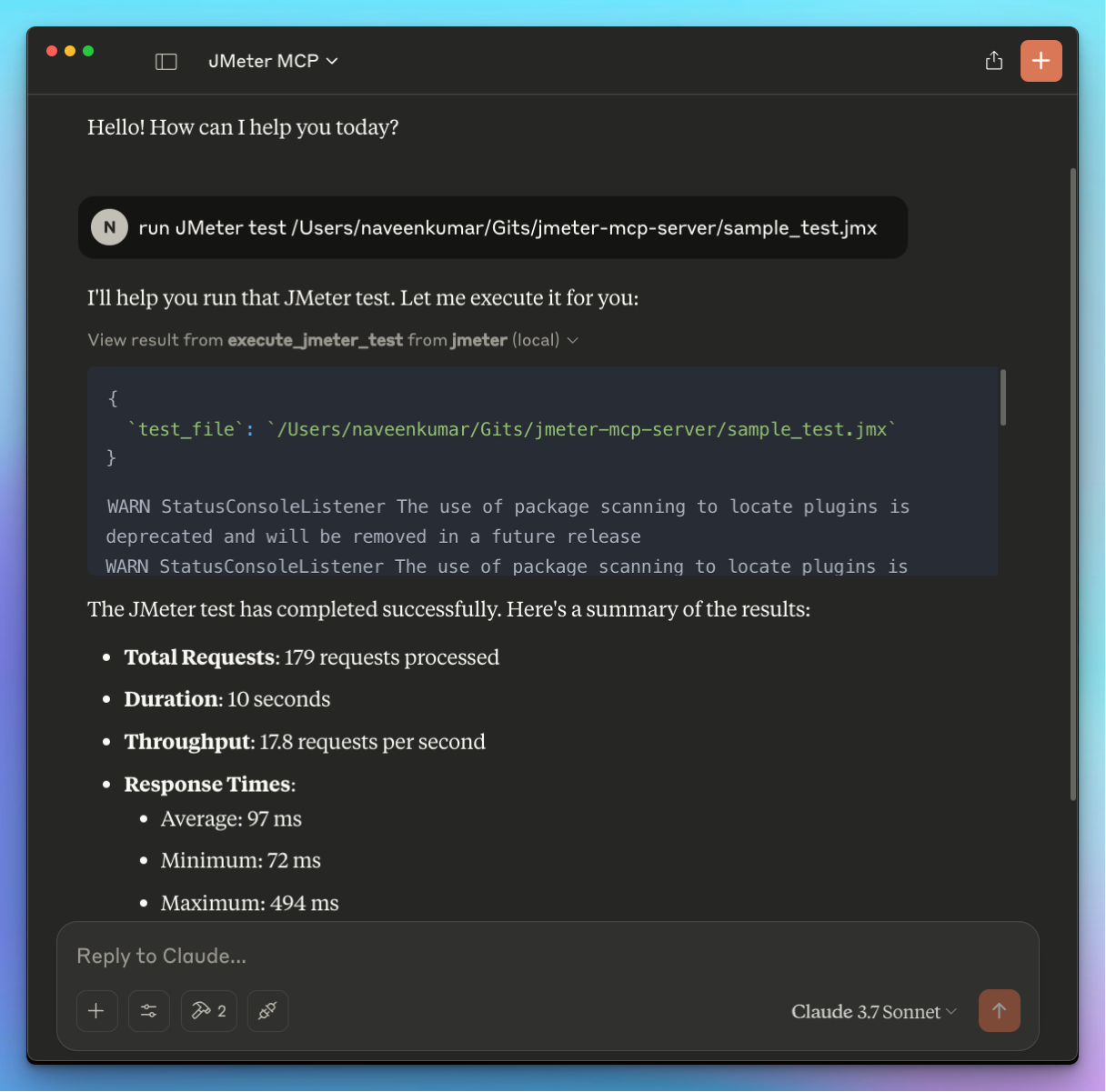🚀 Servidor Jmeter Mcp
✨ ¡JMeter se encuentra con los flujos de trabajo de IA: Presentamos el servidor JMeter MCP! 🤯
Resumen
¿Qué es el Servidor JMeter MCP?
El ### Servidor JMeter MCP es una solución innovadora que integra Apache JMeter con flujos de trabajo de IA, mejorando las capacidades de pruebas de rendimiento. Permite a los usuarios ejecutar pruebas de JMeter de manera más eficiente, aprovechando la inteligencia artificial para optimizar los escenarios de prueba y el análisis de resultados. Este servidor está diseñado para desarrolladores y testers que desean agilizar sus procesos de prueba mientras aseguran la entrega de software de alta calidad.
Características del Servidor JMeter MCP
- Integración de IA: El Servidor JMeter MCP utiliza algoritmos de IA para analizar los resultados de las pruebas y proporcionar información que ayuda a optimizar los casos de prueba.
- Interfaz Amigable: Ofrece una interfaz intuitiva que simplifica el proceso de creación y gestión de planes de prueba.
- Escalabilidad: El servidor puede manejar múltiples ejecuciones de pruebas simultáneamente, lo que lo hace adecuado para entornos de prueba a gran escala.
- Monitoreo en Tiempo Real: Los usuarios pueden monitorear las ejecuciones de pruebas en tiempo real, lo que permite ajustes y solución de problemas inmediatos.
- Informes Comprensivos: El servidor genera informes detallados que proporcionan información sobre métricas de rendimiento, ayudando a los equipos a tomar decisiones informadas.
Cómo Usar el Servidor JMeter MCP
- Instalación: Descargue el Servidor JMeter MCP del repositorio oficial y siga las instrucciones de instalación proporcionadas en la documentación.
- Configuración: Configure los ajustes del servidor de acuerdo con sus requisitos de prueba. Esto incluye la configuración de parámetros de prueba, opciones de integración de IA y permisos de usuario.
- Creación de Planes de Prueba: Utilice la interfaz amigable para crear y personalizar sus planes de prueba. Puede definir escenarios, especificar condiciones de carga y establecer métricas de rendimiento.
- Ejecución de Pruebas: Inicie sus pruebas directamente desde el servidor. Los algoritmos de IA analizarán la ejecución en tiempo real, proporcionando información y sugerencias.
- Revisión de Resultados: Después de la ejecución de la prueba, revise los informes comprensivos generados por el servidor. Utilice estas ideas para optimizar su aplicación y mejorar el rendimiento.
Preguntas Frecuentes
P1: ¿Cuál es el propósito principal del Servidor JMeter MCP?
R1: El propósito principal del Servidor JMeter MCP es mejorar las pruebas de rendimiento mediante la integración de flujos de trabajo de IA, permitiendo una ejecución y análisis de pruebas más eficientes.
P2: ¿Puedo usar el Servidor JMeter MCP para pruebas a gran escala?
R2: Sí, el Servidor JMeter MCP está diseñado para manejar entornos de pruebas a gran escala, soportando múltiples ejecuciones de pruebas simultáneas.
P3: ¿Hay algún costo asociado con el uso del Servidor JMeter MCP?
R3: El Servidor JMeter MCP es un repositorio público y está disponible de forma gratuita. Sin embargo, los usuarios pueden necesitar considerar los costos asociados con la infraestructura y herramientas adicionales.
P4: ¿Cómo mejora la IA el proceso de prueba en el Servidor JMeter MCP?
R4: La IA mejora el proceso de prueba al analizar los resultados de las pruebas en tiempo real, proporcionando información que ayuda a optimizar los casos de prueba y mejorar el rendimiento general.
P5: ¿Dónde puedo encontrar más información sobre el Servidor JMeter MCP?
R5: Más información se puede encontrar en el sitio web oficial jmeter.ai y en el repositorio de GitHub QAInsights/jmeter-mcp-server.
Detalle
Configuración del Servidor
{
"mcpServers": {
"jmeter-mcp-server": {
"command": "docker",
"args": [
"run",
"-i",
"--rm",
"ghcr.io/metorial/mcp-container--qainsights--jmeter-mcp-server--jmeter-mcp-server",
"python main.py"
],
"env": {}
}
}
}Información del Proyecto
🚀 Servidor Jmeter M... Alternativas
Para algunas alternativas a 🚀 Servidor Jmeter M... que puedas necesitar, te ofrecemos sitios divididos por categoría.
Búsqueda en la web utilizando la búsqueda gratuita de Google (NO SE REQUIEREN CLAVES DE API)
🚀 La biblioteca de componentes Tailwind CSS más fácil, gratuita y de código abierto con clases semánticas.
Un servidor de Protocolo de Contexto de Modelo para la API de Datos Publicados de Chess.com. Esto proporciona acceso a los datos de jugadores de Chess.com, registros de partidas y otra información pública a través de interfaces MCP estandarizadas, permitiendo a los asistentes de IA buscar y analizar información sobre ajedrez.
Un servidor de Protocolo de Contexto de Modelo (MCP) que permite a los asistentes de IA consultar y analizar bases de datos de Azure Data Explorer a través de interfaces estandarizadas.
mcp-gitee es una implementación del Protocolo de Contexto de Modelo (MCP) para Gitee. Proporciona un conjunto de herramientas que interactúan con la API de Gitee, permitiendo a los asistentes de IA gestionar repositorios, problemas, solicitudes de extracción, etc.
Mcp Servidor Airbnb
